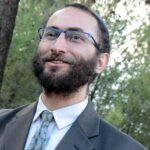Then shall the land make up for its Sabbatical years throughout the time that it is desolate and you are in the land of your enemies; then shall the land rest and make up for its Sabbatical years. (Leviticus 26:34)
Today, research on the benefit of keeping fields fallow shows an increase of around 15 percent in crop yields.¹ An additional benefit of conventional agriculture ceasing work for a period is reduction of chemical fertilizers and pesticides, and not compacting the earth with heavy combines (large farming machines).
As this verse states, the punishment for not adhering to Sabbatical laws was banishment from the land. This exile occurred for about 70 years, which is 16 percent, or about one seventh of the time the Israelites farmed the land. (The period of Israelite habitation during the First Temple period spanned 430 years, and ended in 586 B.C.E.) As I mention in Eco Bible: An Ecological Commentary on the Torah, history seems to affirm that the land of Israel made up the Sabbatical years by being desolate for a similar amount of years that the Israelites may not have sufficiently observed the Sabbatical year.
Rabbi Dr. David Seidenberg notes, “The Torah portrays the land as a subject, with interests, rewards, and rights that take priority over our needs. Especially in the laws of the Jubilee and Shmita years (Lev. 25) – and in the consequences that are supposed to befall the people if they do not observe these laws (Lev. 26) – it is clear that God is ready to take the side of the land of Israel against the Jewish people. Humanity as a social order, as a species, and all the more so as a collection of individuals, has no moral standing when its interests conflict with the intrinsic interests of the land, who will “enjoy her Sabbaths” (Leviticus 26:34) – even if that means the people are exiled or wiped out.
This is the land ethic of the Torah, which is congruent with the more radical statements of deep ecology (in which the needs of the ecosystem come before human needs), and with the idea of a land ethic articulated first by Aldo Leopold in 1949. Leopold’s most important argument, vis-à-vis the moral value of human society, is that human beings as a species are citizens of the land and not rulers over it – in other words, from the perspective of a land-centered ethic, we are on a par with other species. In all these tropes, the highest ethical priority is given to the land or, in modern terms, to the ecosystem, while all the creatures – even human beings – find their place and ethical status in the greater context of the land.”²
May we merit to observe the Sabbatical year in a deep and meaningful way, and to live in balance with the land.
—
¹ A.E.Hartemink, “Sweet Potato Yields and Nutrient Dynamics After Short-term Fallows in the Humid Lowlands of Papua New Guinea,” NJAS – Wageningen Journal of Life Sciences 50, no. 3–4 (2003): 297-319, https://doi.org/10.1016/S1573-5214(03)80014-3.
² Rabbi Dr. David Seidenberg, Kabbala and Ecology, Cambridge University Press: 2015, p. 166
 Rabbi Yonatan Neril founded and directs The Interfaith Center for Sustainable Development and its Jewish Eco Seminars branch. Raised in California, Yonatan completed an M.A. and B.A. from Stanford, and received rabbinical ordination in Israel. He speaks internationally on religion and ecology. He co-organized twelve interfaith environmental conferences in Jerusalem and America. He is the lead author of three Jewish ecological books, including Eco Bible: An Ecological Commentary. He lives with his wife, Shana and their two children in Jerusalem.
Rabbi Yonatan Neril founded and directs The Interfaith Center for Sustainable Development and its Jewish Eco Seminars branch. Raised in California, Yonatan completed an M.A. and B.A. from Stanford, and received rabbinical ordination in Israel. He speaks internationally on religion and ecology. He co-organized twelve interfaith environmental conferences in Jerusalem and America. He is the lead author of three Jewish ecological books, including Eco Bible: An Ecological Commentary. He lives with his wife, Shana and their two children in Jerusalem.
Shmita Friday is just one piece of a large conversation that has been ongoing for a long time! We’d love to hear what you think – post a comment below, join our facebook group, and start talking about shmita with your friends and family.